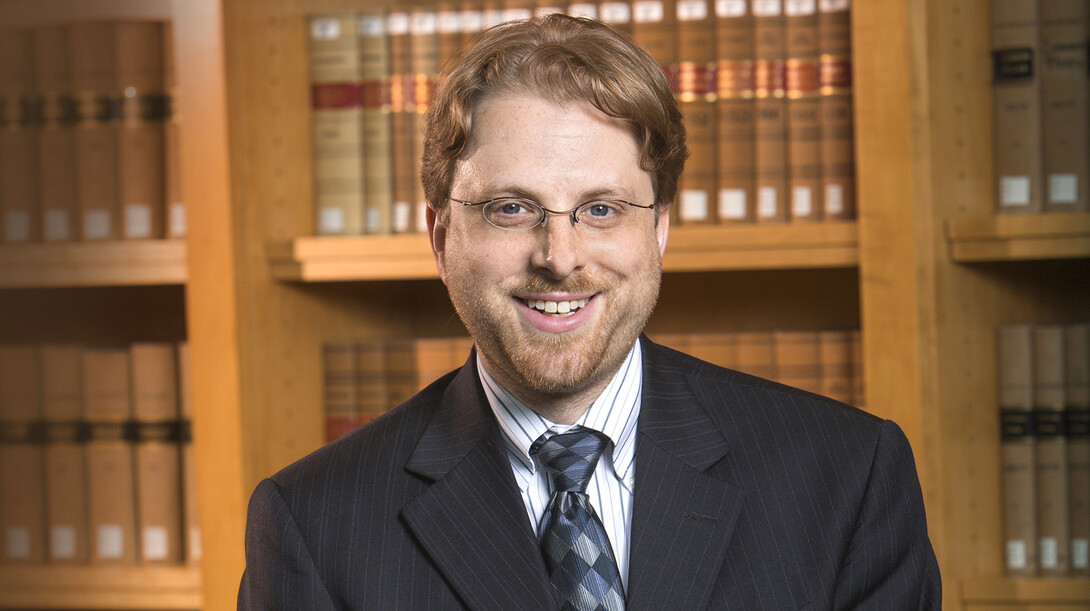
Been faced with any of these questions lately?
Why is my favorite website running slowly? Can I ask my ISP for an explanation?
Why has my cable provider stopped carrying my favorite local channels? Who’s at fault? When will the programming be back? And what about Husker games?
Grandpa wants to ditch his land line in favor of his cell phone. But how will he get his pacemaker checked?
The technology issues people wrestle with in their offices and TV rooms are interconnected with the regulatory and policy issues under examination in government chambers and academic halls.
Justin “Gus” Hurwitz, a professor of telecommunications law at the University of Nebraska College of Law, says issues of broadband speed and availability are going to get more challenging for citizens and policymakers in coming years as people around the world become more deeply entwined with the Internet.
A September conference in Washington, D.C., co-hosted by the Nebraska Law’s Space, Cyber and Telecommunications Law program, the Federal Communications Commission and the American Enterprise Institute, will take aim at emerging policy and regulatory issues facing the broadband sector.
College of Law Dean Susan Poser said that it “will provide an important forum for academics and FCC regulators to exchange ideas about the issues just beyond the horizon, in a future where many Americans will have not just one or two Internet-connected devices, but 10, 20 or even 100 or more.”
“It’s not just telephones and video devices, but it’s your wristwatch, your baby monitor, medical devices, the refrigerator, the thermostat, the garage door, your car, pet monitors …” Professor Hurwitz, a lead organizer of the conference, said.
Nebraska’s Space, Cyber and Telecommunications Law program, the only program of its kind in the world, has held two conferences each year for the past seven years, a spring event in Lincoln and a fall event in Washington DC.
This fall’s program, however, marks a change. This year, the FCC has agreed to cohost two academic workshops, so that FCC lawyers, technology experts, and economists can interact with academic researchers who study technology policies and regulations. Because the Space, Cyber and Telecommunications Law program already hosts an annual conference in DC, it was a natural fit for Nebraska to cohost the upcoming workshop. As a result, Nebraska divided its fall conference into two events, the September workshop focusing on telecommunications legal scholarship and a separate November conference addressing space and cyber law.
“The purpose of the conference is to share cutting-edge academic thinking and research with the Commission,” Hurwitz said. “We can get into a real discussion. It’s about developing research; it isn’t about advocacy. It’s getting research before people who really use that research to develop policy.”
The Sept. 10-12 event, to be held in the FCC’s main meeting room, will feature a half day of keynote panels that are open to the public, a full day of invitation-only panels, and a final half day public session to hone the overall themes of the conference.
Hurwitz said between 30 to 40 experts are expected to participate in the workshop, including prominent scholars studying broadband policy questions. The research under discussion will be highly technical, dealing with economics and regulation, yet it will address issues that affect everyday technology users, such as Internet-delivered TV and video content, rural broadband access, interconnection between internet service providers, and local news delivery. The FCC’s proposed regulations to create an Internet “fast lane “– which opponents contend will erode net neutrality – is too far along in the process to be an official agenda item. Hurwitz, however, said it will likely be looming as a topic of conversation. The FCC’s public comment period on the controversial proposed regulation ends in mid-September and the agency is expected to issue its rules on the topic yet this fall.
The September event is one of three conferences the Space, Cyber and Telecommunications Law program is hosting this academic year. The other two events (both of which are hosted solely by Nebraska, unlike the September event which is cohosted with the FCC) are the November conference on space and cyberlaw issues in Washington, DC, and a month-long series of virtual workshops in April, hosted in Lincoln, Nebraska and broadcast on the web.







